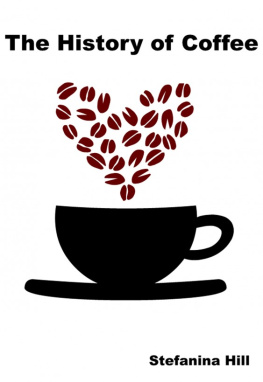Stefanina Hill - The History of Coffee
Here you can read online Stefanina Hill - The History of Coffee full text of the book (entire story) in english for free. Download pdf and epub, get meaning, cover and reviews about this ebook. year: 2010, genre: Art. Description of the work, (preface) as well as reviews are available. Best literature library LitArk.com created for fans of good reading and offers a wide selection of genres:
Romance novel
Science fiction
Adventure
Detective
Science
History
Home and family
Prose
Art
Politics
Computer
Non-fiction
Religion
Business
Children
Humor
Choose a favorite category and find really read worthwhile books. Enjoy immersion in the world of imagination, feel the emotions of the characters or learn something new for yourself, make an fascinating discovery.
- Book:The History of Coffee
- Author:
- Genre:
- Year:2010
- Rating:4 / 5
- Favourites:Add to favourites
- Your mark:
- 80
- 1
- 2
- 3
- 4
- 5
The History of Coffee: summary, description and annotation
We offer to read an annotation, description, summary or preface (depends on what the author of the book "The History of Coffee" wrote himself). If you haven't found the necessary information about the book — write in the comments, we will try to find it.
The History of Coffee — read online for free the complete book (whole text) full work
Below is the text of the book, divided by pages. System saving the place of the last page read, allows you to conveniently read the book "The History of Coffee" online for free, without having to search again every time where you left off. Put a bookmark, and you can go to the page where you finished reading at any time.
Font size:
Interval:
Bookmark:
The History of Coffee
Author : Stefanina Hill
Smashwords Edition
Copyright 2010 Stefanina Hill
The History of Coffee.
Introduction.
For approximately one third of the world's populationthe word "coffee" is synonymous with waking up and preparing forthe day, it's also synonymous with working late, taking breaks,socializing and relaxing. With such an integral role to play ineveryday life it's no surprise that this energizing brew is themost popular drink worldwide with over four hundred billion cupsbeing consumed each and every year. Coffee has a history ofcontroversy and intrigue that spans several centuries and theentire globe, from its discovery coffee has been extremely popularand the fever to acquire and control the means of distributing sucha valuable commodity has left an unmistakably strong mark uponworld history.
From small evergreen bushes known as the CoffeaCanephora and the Coffea Arabica coffee berries are harvested,these contain the seeds of the plant. The seeds are then processed,dried and roasted and voila, coffee beans! Today these plants arecultivated in Latin America, Southeast Asia and Africa and thenshipped all over the world but where did coffee originate from?
Discovery of Coffee.
The discovery of coffee can be traced back to theninth century in the highlands of Ethiopia which was at that timeknown as Abyssinia. The exact details of how the properties of thisplant were discovered by people are unclear and more than onelegendary account exists. One popular legend states that a shepherdnamed Kaldi observed how goats which consumed certain red wildberries became animated and energized after eating them. In factthe goats were so affected by the berries they were dancing around.Kaldi ate the berries also and enjoyed a burst of energy himself.This legend is also the source of the phrase "like a dancing goat"which is used to indicate restlessness of movement.
Further legendary accounts propose that one day amonk was passing by where Kaldi grazed his flock and observed boththe shepherd and his goats at their dance. This prompted the monkto procure some of the berries in order to enable him to stay awakefor longer sessions of prayer at his monastery. According to thislegend when the other monks at the monastery were told about theberries they processed them into a stimulating drink, historyhowever credits the Arabs with being the first to create a beveragemade from coffee berries.
In the tenth century the fruit of the coffee plantwas mixed with animal fat and formed into small balls by tribesmenof the area who would then consume them as a stimulating form ofsustenance. This snack could be prepared, wrapped in leaves andtaken on long walks or hunts to provide essential sustenance forthese hardy people.
It is thought by some that coffee was originallynamed for the region of Kaffa in Ethiopia
and that this area may have been linked with the discovery of theberries. It is however more likely that the name derives from theArab word "qahwa" which means wine or coffee, indeed in Arabiacoffee was regarded as an alternative to wine and in the days whencoffee first reached Europe it was known as the "wine ofArabia".
The History of Coffee Global Spread of CoffeeDrinking
Coffee was taken by traders across the Red Sea toEgypt and Arabia (known today as Yemen). Circa 1100 in Arabia aprocess of roasting and brewing coffee to form a drink wasinitiated. In this form coffee reached the Middle East, Persia,Turkey and Northern Africa. The drink was popular due to itsenergizing qualities but was also thought to be of value incombating illness, particularly stomach ailments, at this earlystage coffee was already established as a popular beverage for partof a morning ritual.
The method of processing, roasting and then grindingthe beans to make a drink of coffee has been accredited to thefourteenth or fifteen century. The Arabs began to cultivate theirown coffee crops after the fourteen century and as the popularityof coffee increased so did their protectiveness towards thisvaluable commodity. It was prohibited to take coffee plants out ofthe region, the young trees were grown upon guarded plantations anda process of boiling the berries in order to render the seedssterile was developed. Eventually, however, fertile beans weresmuggled out.
Coffee Houses.
The world's first coffee house was called Kiva Hanand it opened in Istanbul in 1471 but coffee and coffee drinkingwas certainly not easily accepted despite its instant popularity.Many of the first coffeehouses were opened in Mecca and were called'kaveh kanes'. They quickly spread throughout the Arab world andbecame successful as places where chess was played, gossip wasexchanged, and singing, dancing and music were enjoyed. Coffeeshops were luxuriously decorated and each one had an individualcharacter. Nothing quite like the coffeehouse had existed before, aplace where society and business could be conducted in comfortablesurroundings and where anyone could go for the price of a cup ofcoffee.
As coffee was a social beverage it caused someconsternation in Mecca, hitherto all social gathering places werespecifically focused on religion and the stimulating effects of thedrink were viewed suspiciously by some.
Bans Against Coffee.
In 1511 a theological court in Mecca banned coffeebut due to the popularity of the drink this ban was eventuallyoverturned in 1524. Time and time again throughout history coffeehouses have been faced either with suppression or complete removalbut always the immense popularity of coffee drinking has renderedthe attempts to successfully ban the sale and consumption of coffeeuseless and also potentially dangerous for the ruling powerattempting to do so.
Another ban was enforced in Egypt a few years laterin 1532 and this move resulted in the sacking of coffee houses andwarehouses containing stores of the beans but Selim the first,Sultan of the Ottoman Empire, overturned the decrees and thedrinking of coffee was declared to be perfectly orthodox.
Now that coffee had begun to be used so widely inArabia, and sometimes used in religious ceremonies in place ofwine, another ban came into place in coffee's country of origin.The Ethiopian Church enforced this ban sometime before the 17thcentury and it was not lifted until the reign of Emperor Menelik IIin the late nineteenth century, with the emperor's partiality tothe drink doing much to dissuade the Christian clergy that coffeewas a Muslim or pagan drink.
The 17th century also saw a ban in OttomanTurkey although this was not on religious grounds but political. Insome of these political cases the disapproval was not particularlyleveled against coffee itself but the danger of coffeehouses, thegathering places which gave people an opportunity to come togetherand talk about potentially rebellious things.
Coffee Drinking Becomes Accepted.
Due to thriving trade between Venice and NorthAfrica, Egypt and the Middle East coffee arrived in Italy viaVenetian traders in 1615 and from there it spread throughoutEurope. Initially coffee was only sold by lemonade vendors as amedicinally beneficial beverage.
At this point coffee had another brush withwidespread controversy, there were calls for a ban upon what somecalled a Muslim or even a heretic's drink. Pope Clement VIIIdecided to sample the drink for himself and officially deemedcoffee to be a Christian beverage in 1600, upon doing so he madethe famous pithy declaration "This drink of Satan is so deliciousthat it would be a shame to leave it to the Infidels. Let usconfound Satan by blessing it."
This blessing led to a wider acceptance of the drinkin Italy and Europe and the first European coffee house opened inVenice in 1683. The Cafe Florian opened in Piazza San Marco in 1720and went on to become the most famous coffeehouse in Europe and itis still open and serving coffee to this day.
Next pageFont size:
Interval:
Bookmark:
Similar books «The History of Coffee»
Look at similar books to The History of Coffee. We have selected literature similar in name and meaning in the hope of providing readers with more options to find new, interesting, not yet read works.
Discussion, reviews of the book The History of Coffee and just readers' own opinions. Leave your comments, write what you think about the work, its meaning or the main characters. Specify what exactly you liked and what you didn't like, and why you think so.












